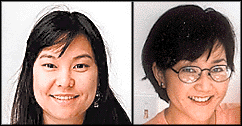Advertisement - Click to support our sponsors.


![]()
The Goddess Speaks
"Mum mum," my 19-month-old Brianne pleads as she tugs at my blouse. I offer her one of the rice crackers I carry in my purse for such moments, but turning her head away, she puts her mouth to my breast. Upfront talk about
breastfeedingI look for some corner to retreat to, but no such place exists in Costco. It occurs to me to abandon my cart full of merchandise and rush to my car to nurse my child comfortably and in privacy. But I would never make it there. The call of "mum mum" from a breastfed baby is not a warning call, it is a desperate cry of hunger which if not heeded grows into a heart-wrenching, empty-bellied wail.
Turning into a nearby aisle, I try to disappear into a display of mops to nurse my daughter.
We prefer not to nurse in public. We prefer to nurse in the privacy of our own homes. But we have "Costco" experiences every day; it is a necessity to nurse in public.
A few months ago, we watched a TV news report about a woman ordered off a city bus for breastfeeding her child. Thankfully, the Legislature saw the nonsense of it all and passed a bill legalizing breastfeeding in public this session.
We're relieved lawmakers support our right to nurse our children in public when necessary, but we're still disappointed at a society that requires such legislation. In a world that accepts TV series such as "Baywatch," where scantily clad, big-breasted women bounce on the beach each episode, it's ludicrous that witnesses would turn against a woman who uses her breasts to nuture and sustain her child. Where are our values?
Perhaps critics of public nursing would rethink their position if they knew more about the benefits of breastfeeding. Comparing human milk to that of other species, Jean Zimmer, in "Motherwear," made a compelling case.
"The milk of a whale," Zimmer says, "enables its baby to double in size in a few weeks and withstand cold seas. The milk of a human, in contrast, is optimized for rapid growth of brain tissue. Breastmilk is not a nutritional alternative; it is by far the best way to nourish a child."
Breastmilk , Zimmer adds, "contains about 100 amino acids, vitamins, and minerals, including salts and sugars, in a recipe made specifically to satisfy" your child. The milk produced by the mother of a premature infant differs from that of the mother of a full-term infant.
In recent years, breastmilk has also been credited with lowering a child's risk for asthma, diabetes and some cancers. These facts prompted the American Academy of Pediatrics to recommend in 1998 that children be nursed for a minimum of one year and preferably into the second year of life.
In the September issue of Child, Dr. Lawrence M. Gartner, a professor of pediatrics and obstetrics/gynecology at the University of Chicago, said, "The more time a woman devotes to breastfeeding over her life, the less her risk of breast cancer, osteoporosis, hip fractures and ovarian cancer."
Health benefits aside, we think it is vital that our daughters carry with them an intimate knowledge (whether in conscious or unconscious memories) of a woman's body being used to sustain the life of one who is beloved by her.
With all that breastfeeding provides for our daughters and ourselves, if other people find public nursing offensive, all we can say is we're sorry, but your discomfort is a meager price to pay.
Lisa Johnson is mother to 19-month-old Brianne and
Joleen Oshiro is mother to 2-year-old Mia.
The Goddess Speaks runs every Tuesday
and is a column by and about women, our strengths, weaknesses,
quirks and quandaries. If you have something to say, write it and
send it to: The Goddess Speaks, the Honolulu Star-Bulletin, P.O.
Box 3080, Honolulu, 96802, or send e-mail
to features@starbulletin.com.